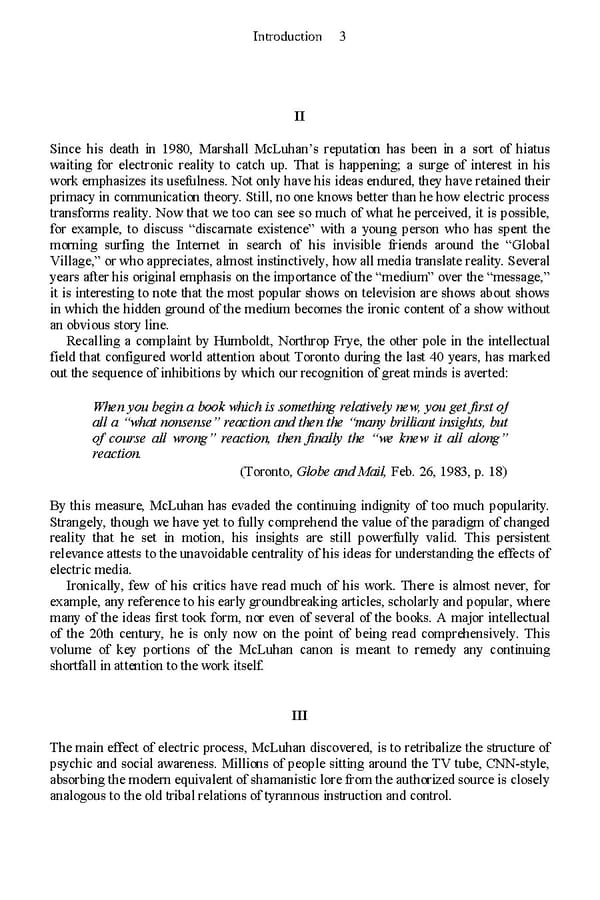Introduction 3 II Since his death in 1980, Marshall McLuhan’s reputation has been in a sort of hiatus waiting for electronic reality to catch up. That is happening; a surge of interest in his work emphasizes its usefulness. Not only have his ideas endured, they have retained their primacy in communication theory. Still, no one knows better than he how electric process transforms reality. Now that we too can see so much of what he perceived, it is possible, for example, to discuss “discarnate existence” with a young person who has spent the morning surfing the Internet in search of his invisible friends around the “Global Village,” or who appreciates, almost instinctively, how all media translate reality. Several years after his original emphasis on the importance of the “medium” over the “message,” it is interesting to note that the most popular shows on television are shows about shows in which the hidden ground of the medium becomes the ironic content of a show without an obvious story line. Recalling a complaint by Humboldt, Northrop Frye, the other pole in the intellectual field that configured world attention about Toronto during the last 40 years, has marked out the sequence of inhibitions by which our recognition of great minds is averted: When you begin a book which is something relatively new, you get first of all a “what nonsense” reaction and then the “many brilliant insights, but of course all wrong” reaction, then finally the “we knew it all along” reaction. (Toronto, Globe and Mail, Feb. 26, 1983, p. 18) By this measure, McLuhan has evaded the continuing indignity of too much popularity. Strangely, though we have yet to fully comprehend the value of the paradigm of changed reality that he set in motion, his insights are still powerfully valid. This persistent relevance attests to the unavoidable centrality of his ideas for understanding the effects of electric media. Ironically, few of his critics have read much of his work. There is almost never, for example, any reference to his early groundbreaking articles, scholarly and popular, where many of the ideas first took form, nor even of several of the books. A major intellectual of the 20th century, he is only now on the point of being read comprehensively. This volume of key portions of the McLuhan canon is meant to remedy any continuing shortfall in attention to the work itself. III The main effect of electric process, McLuhan discovered, is to retribalize the structure of psychic and social awareness. Millions of people sitting around the TV tube, CNN-style, absorbing the modern equivalent of shamanistic lore from the authorized source is closely analogous to the old tribal relations of tyrannous instruction and control.
 Essential McLuhan Page 9 Page 11
Essential McLuhan Page 9 Page 11